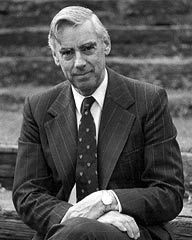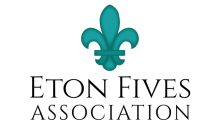
Michael Charlesworth (1919-2008)
Michael Charlesworth who has died at the age of 89, has long been regarded as the doyen of Shrewsbury School where he was for many years the Master in Charge of Fives and it was he who played a large part in having the court built at the illustrious Geelong Grammar School, thus introducing the game to Australia.
It was during an exchange year to Geelong in 1953-54 that the then Reptonian Headmaster Jim Darling had a brainwave: “Now you are here” he said, “we’ll have Fives!” So an old ball court built for some defunct game was adapted for Eton Fives, Jim Darling having been a keen player himself. One day Michael received a note while teaching asking him to go to the Fives court; there were the Headmaster and the workmen who were building the top of the front wall. “It’s getting a bit expensive” he said, “Do we really need the wall to be so high?” “No!” he said to the workmen, who at once suspended action. So the front wall to this day (as far as we know) looks like a medieval battlement. Michael taught a number of boys and they really enjoyed the game but it gradually fizzled out after he left, although there have been times of revival. Nevertheless Michael felt that his great contribution to the Southern Hemisphere had been to build the first and only Fives court.
As a player of good ability he made few mistakes and was particularly steady at the back. Once, he and fellow Salopian Geoffrey Phillips were drawn the against the legendary May brothers in the Kinnaird Cup. They came off court having had what seemed to them a fantastic match with numerous rallies, but, in common with other leading players of the day, they had won only a handful of points.
From Abinger Hill Prep School in Surrey, Michael proceeded to Shrewsbury School where he was happy and successful, and the School – what it stood for, the friends he made there and the arcadian magic of its setting – worked its way into the very core of his being, where it remained for the rest of his life.
After Shrewsbury, Michael followed his father to Magdalen College, Oxford, where he read History. A talented athlete, he pursued an active sporting life as well as becoming an enthusiastic member of the OUDS. Acting and the theatre were to remain lifelong interests. His Oxford career finished at the start of the war and there followed six distinguished years of service in India, Burma and, at the end of the war, in a newly-liberated Norway, organising the evacuation of 130,000 German soldiers and 40,000 Russian prisoners of war.
He then returned to Oxford to train as a teacher and was appointed to the staff at Shrewsbury in 1947. His career seemed destined to follow a conventional course and, following the one-year exchange at Geelong, he served as Housemaster of School House, the largest boarding house, from 1955 to 1961. This was a rich period during which Paul Foot, Richard Ingrams, Michael Palin, Willie Rushton and John Ravenscroft (Peel), with all of whom he later kept in touch, were at the School. In 1958 he married Joy Brooke-Smith, the widow of an Old Salopian with whom he had been at school. She had three children by her first marriage and they went on to have two sons of their own, Martin, born in 1959, and Alan, in 1961.
That same year Michael returned to the East and took up the headmastership of Lawrence College in Pakistan, a school run along English public school lines which had fallen upon hard times. This experience gave him many Pakistani friends with whom he was in contact for the remainder of his life. Within four years the College was again holding its head high as one of Pakistan’s leading public schools, and Michael and Joy returned to Shrewsbury, by now in the grip of the changes being wrought by its great reforming Headmaster Donald Wright.
Although never actually himself Headmaster of Shrewsbury, Michael’s experience of running both a house and a school rendered him invaluable, and over the next 25 years and over a period of three different Headmasters, he served several stints as Acting Housemaster, Acting Headmaster and even Acting Bursar. He finished his formal Shrewsbury School career as Second Master for 12 years until his retirement in 1981.
A kind and compassionate man, for whom interest in his pupils very frequently evolved into lifelong friendship, he possessed a prodigious memory for people and a decisive and practical approach to life. These attributes gave him a very rich retirement, during which he edited the school magazine and continued to organise the Old Salopian Club, of which he was secretary for 48 years from 1950 until 1998. He served on the governing bodies of many schools, including Moreton Hall, where a new boarding house was named after him in 2004 and was involved in church affairs, as a lay reader at St Chad’s in Shrewsbury and for several years as a member of the General Synod. A prolific correspondent, his vast network of Salopian friends, a deep interest in the history and politics of the School and a facility with the pen resulted in numerous publications, principal amongst them his aptly named autobiography “Behind the Headlines”, published in 1994.
His wife Joy died in 1987 and he is survived by his two sons and two stepsons Bruce and Robin, to whom we send our condolences.
